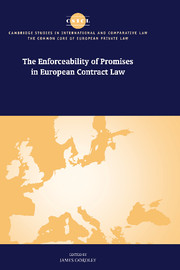1 - Some perennial problems
Published online by Cambridge University Press: 18 May 2010
Summary
A basic difference between modern civil law and Roman law is supposed to be that in modern law, in principle, contracts are enforceable upon consent. In Roman law, when they were enforceable depended on the type of contract in question. A basic difference between the modern common law and civil law is supposed to be that the common law requires a contract to have ‘consideration’. The civil law does not. This study is concerned with the extent to which these characterizations are true, and how these and other differences affect the enforceability of promises.
The method is that of the Trento Common Core of European Private Law Project. Experts from different legal systems have been asked how their law would resolve a series of hypothetical cases. Because of the larger purposes of the Project, and because one has to draw the line somewhere, the legal systems are those of member states of the European Community. Sometimes, the expert's opinion about a case is conjectural, and the experts were asked to note when it is. In these instances, admittedly, another expert from the same legal system might decide the case differently. But the value of the expert opinions is not that they tell us how the case will come out. It is that they tell us which cases are clear, which are troublesome, the reasons why they are troublesome, and the doctrines that might be applied to resolve the difficulties.
- Type
- Chapter
- Information
- Publisher: Cambridge University PressPrint publication year: 2001

